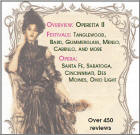Texte paru dans: / Appeared in: |
|
|
Outil de traduction ~ (Très approximatif) |
|
|
Reviewer: John
W,. Barker Ottone was first performed in January of 1723. Its libretto was a revision of one used by Antonio Lotti for his Teofane, first performed in 1719—and Handel was well aware (of) that. The plot is a hash of historical facts as they were understood in the 18th Century. The German Emperor Otto I (936-973), hoping to flesh out his revival of empire in western Europe, contracted an alliance with the Byzantine Emperor in Constantinople. By its terms Otto’s heir, the future Otto II (973-983—our Ottone) would marry a Byzantine princess named Theofane, furthering his ambitions in Italy. It used to be thought that she was the sister of future Emperor Basil II, but that has been disproved. She was no porphyrogenite or “purple born”, and her actual relationship to one or another Byzantine usurpers is still debated. But she was married to the soon-to-be Otto II in 982 in Rome. There was no romantic nonsense about all this. It was a political match, and maybe she was fobbed off with false credentials. Nevertheless, Theofane did prove to be a very valuable asset to the German court: she was a significant advisor to her husband and then a crucial regent for her young son, Otto III (983-1002), whose visionary ideas she strongly influenced. (And, by the way, a true Byzantine princess was on her way to marry him, only to find him dead when she arrived. Maybe there’s another opera on that somewhere!) In the long and wordy libretto, Ottone is opposed by Gismonda, widow of Berengar, late ruler of a now-uppressed Lombard state. She seeks to win for her son, Adalberto, control of Italy. But Adalberto is betrothed to Ottone’s cousin Matilda (apparently based on the historical Countess Matilda of Tuscany). If all that sounds complicated, try following the tangle of misunderstandings, conspiracies, deceptions, and trickeries that make up the plot, which is resolved when the pirate Emireno, captured in battle by Ottone, turns out to be brother of Teofane, the future Emperor Basil II, who had been driven into exile, disguise, and freebooting by his enemies in Constantinople. (That roar you hear in the background is the chorus of laughter from a troupe of historians.)
But all this is neither historical nor dramatically veristic. It is the usual Baroque platform for no end of dramatic situations and character displays that allow the singers to show their stuff. And, indeed, this long score is full of lovely arias depicting moods from happy to upset. In particular, we come to recognize the feistiness of Teofane and the earnest muddleheadedness of Ottone.
This is no less than the third recording of this opera. Its two predecessors were both based on staged productions: Nicholas McGegan at the 1992 Gottingen Festival (HM 907073: M/J 1993) and Robert King from a traveling production of about the same time (Hyperion 66751: N/D 1993). I had praises for each when they appeared, but favored King’s recording on points. Those two predecessors, however, seem now to be in limbo, so this newest one commands the field. And a worthy one it is. It is apparently a studio recording, made in Italy in the early summer of 2016. The cast is consistently excellent.
Handel wrote two of the roles (Ottone, Adalberto) for castratos—the former for the great Senesino—and here, as in the two earlier recordings, they are taken by countertenors. Cencic here, with a beautiful blooming sound, is more developed and assertive than McGegan’s rather wimpy Drew Minter or King’s foursquare James Bowman. Sabata here pulls back musically from the nasty progression of McGegan’s Ralf Popkin to King’s truly nasty Dominique Visse. In a role written for the great soprano Francesca Cuzzoni, Snouffer creates a nicely rounded Teofane, somewhere between McGegan’s strong Lisa Saffer and King’s girlish Claron McFadden. Hallenberg is vocally ripe as the conniving Gismonda (a meaty role created for Margherita Durastanti), but she does not supersede McGegan’s Jennifer Smith nor, especially, King’s potent Juliana Gondek. Staruskevych here is at least as warm and womanly as the two earlier Matildas (the role created for Cuzzoni’s rival, Anastasia Robinson), Patricia Spence and Catherine Denley. Kudinov here is a manly Emireno (written for the bass Giuseppe Maria Boschi), outshining McGegan’s Michael Dean, but outclassed by King’s Michael George. All in all, this cast is certainly a reasonable successor to the earlier ones.
Petrou, who is emerging as among the foremost of current champions of Handel’s operas, leads an aptly flexible performance, with the period-instrument Pomo d’Oro in fine fettle. Wnen I note that Ottone became one of Handel’s most popular operas, revived four times over the years, Handelians will know automatically that this means textual complications, given the composer’s propensities for making changes and creating new arias. As it happens, that is only part of the story here, because Handel was making constant alterations and rewrites both before and amid the first run in 1723, primarily to favor his two stars, Cuzzoni and Senesino. (It was in rehearsals for this opera that Handel threatened to throw Cuzzoni out the window if she idn’t stick to what he had written for her.) The complexities of all these changes are given a gloriously tedious exposition by annotator David Vickers. The two previous conductors had fitted a few of the newer arias into their editions, but Petrou goes a little further. In the body of his performance, he introduces two arias for Teofane, just as King did. But then, as an appendix at the end, he adds three arias for Ottone, created for the lively 1726 revival. (It should be noted that this appendix runs almost 15 minutes, so the total for the opera itself is actually 188 minutes, more in line with the timing of the two earlier recordings.) These textual fine points add a little extra value to this treatment of Ottone.
This entire release is
exemplary. We are given not just one but two booklets: the first, a slender
one with track lists and notes; the second a fat one of 123 pages devoted to
the libretto with translations. | |
|
Support us financially by purchasing this disc from eiher one of these
suppliers. Un achat via l'un ou l'autre des fournisseurs proposés contribue à défrayer les coûts d'exploitation |
|
|
|
|
|
Cliquez l'un ou l'autre
bouton pour découvrir bien d'autres critiques de CD |
|




